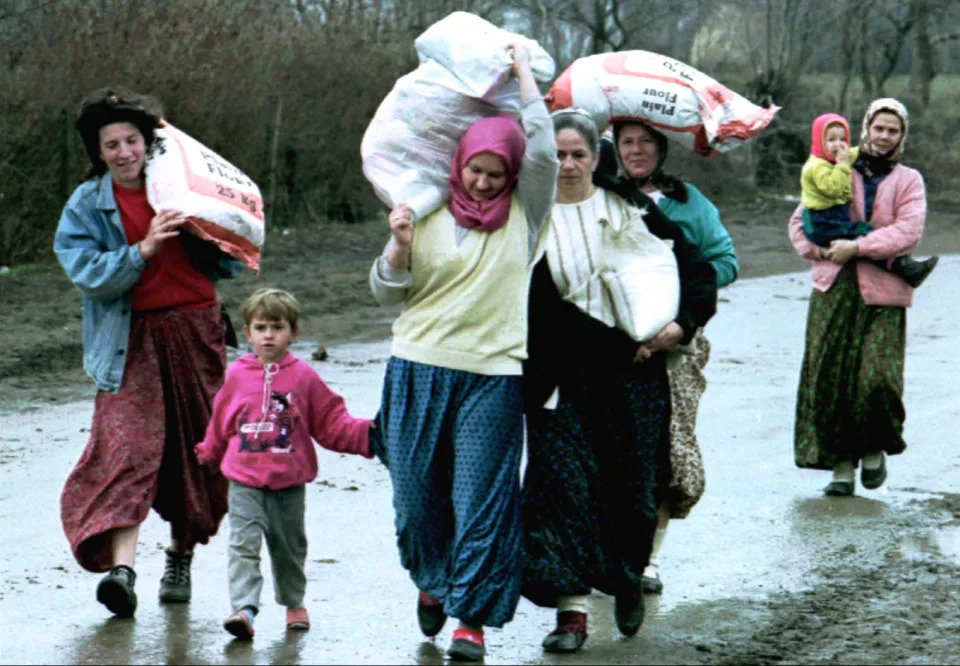USA Today
Russia is using rape as a weapon of war in Ukraine. Here’s what can be done about it.
Carli Pierson, USA TODAY – July 13, 2022
Warning: This column contains graphic descriptions of sexual violence against women, men and children.
“This is how an 11 year old boy sees the world after having been raped by #Russia soldier in front of his mother.” That was the caption above a photograph of chaotic swirls of black marker on a white background painted by a Ukrainian child tweeted by that country’s lawmaker Lesia Vasylenko.
There are many more equally horrific reports, too many to detail here.
As Russian dictator Vladimir Putin continues the onslaught of Ukraine, and this week, as Bosnian Muslims remember the massacre at Srebrenica 27 years after it happened, the unlearned lessons from the horrors of Balkan war scream out at us: “What can we do better?”
The answer isn’t as elusive as it might seem. In fact, it has been proposed by international criminal law and human rights experts for years.
‘Sexual violence can be used strategically as a method of warfare’
Rape has been considered a war crime since the 1949 Geneva Conventions. But it has not been prosecuted like other war crimes and crimes against humanity.
It wasn’t until 1993 that the United Nations Security Council officially recognized mass rape as a weapon of war, and made it eligible for prosecution in the International Criminal Tribunal for the former Yugoslavia.

Catherine Dunmore specializes in international criminal law, human rights law and sexual and gender-based violence. She has served on legal teams that have investigated and prosecuted war crimes, including conflict-related sexual violence.
I reached out about her work investigating sexual violence as a war crime. She said, “The vast majority of victims of conflict-related sexual violence are women and girls, although it’s also perpetrated against men, boys and the LGBTIQ+ community in many settings.”
“Sexual violence” Dunmore said, “can be used strategically as a method of warfare, for instance as a deliberate tactic to undermine the opposition or strike fear in civilian populations.”
She also pointed out that sexual violence can be committed by any party to the conflict, including humanitarian actors.
What is Russia doing in Ukraine?
►Over the past five months of conflict, Russia has carried out repeated, deadly assaults on civilian targets, including a shopping mall and apartment buildings.
►Last week, Ukrainian Prosecutor General Iryna Venediktova told USA TODAY that the number of cases of war crimes is likely more than 10,000.
►As of June 3, the U.N. High Commissioner for Human Rights’ monitoring team had received over 120 reports of alleged conflict-related sexual violence in Ukraine.
►On July 5, High Commissioner Michelle Bachelet reported that her team had “verified 28 cases of conflict-related sexual violence, including cases of rape, gang rape, torture, forced public stripping, and threats of sexual violence. The majority of cases were committed in areas controlled by Russian armed forces, but there were also cases committed in government-controlled areas.”
An independent investigative organization
While investigators inside and outside Ukraine work to collect evidence of war crimes with the hope of eventually prosecuting those crimes, additional options have long been proposed.

In an interview on National Public Radio in May, British lawmaker Arminka Helic talked about her work to “create a permanent, independent and international body to investigate and prosecute rape and sexual violence as war crimes,” reported Leila Fadel.
Helic explained, “If we had a body that is funded, in existence, that has forensic trauma and medical experts already available to be deployed or to be approached by the investigators in Ukraine, we would have by now had an opportunity to collect this evidence, either from the internally displaced people or from the people who have crossed the border.”
My late mentor, the godfather of international criminal law, M. Cherif Bassiouni, had been proposing the same idea since the Balkan war.
The knowledge of a swift, efficient and powerful investigative body charged with the full U.N. authority might also serve as a deterrent to potential war criminals. For instance, fighters would be on notice that it would be much harder to get away with the evidence of their crimes, including the so-called silent ones like rape. Perhaps they would think twice before joining in on the criminal sadism.
We’ve known for decades what we need to do – it’s about time we call on world leaders to make it happen.
Carli Pierson, a New York licensed attorney, is an opinion writer with USA TODAY and a member of the USA TODAY Editorial Board.
